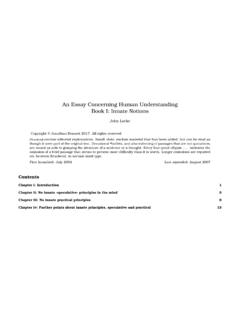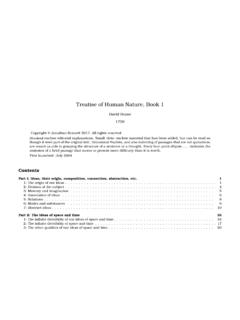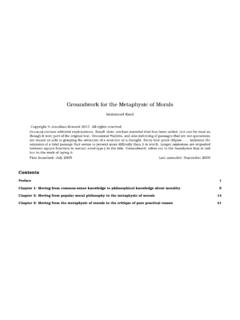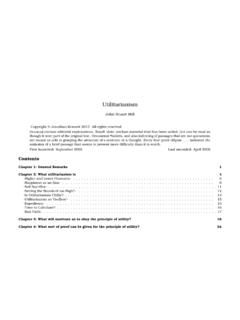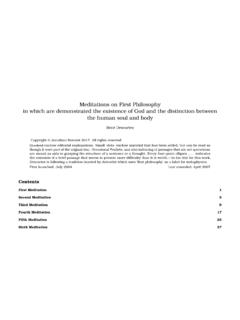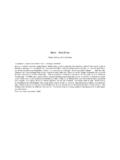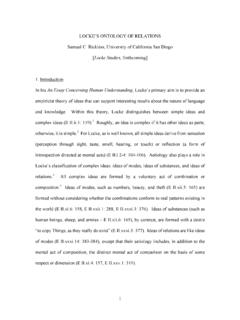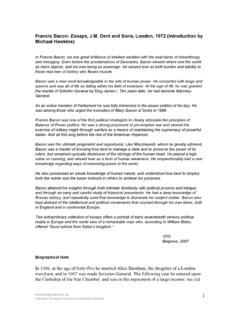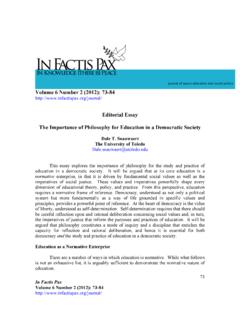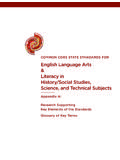Transcription of An Essay Concerning Human Understanding Book …
1 An Essay Concerning Human Understanding book II: Ideas John Locke Copyright Jonathan Bennett 2017. All rights reserved [Brackets] enclose editorial explanations. Small dots enclose material that has been added, but can be read as though it were part of the original text. Occasional bullets, and also indenting of passages that are not quotations, are meant as aids to grasping the structure of a sentence or a thought. Every four-point ellipsis .. indicates the omission of a brief passage that seems to present more difficulty than it is worth. Longer omissions are reported on, between [brackets], in normal-sized type. First launched: July 2004 Last amended: August 2007. Contents Chapter i: Ideas in general, and their origin 18. Chapter ii: Simple ideas 23. Chapter iii: Ideas of one sense 24. Chapter iv: Solidity 24. Chapter v: Simple ideas of different senses 27. Chapter vi: Simple ideas of reflection 27. Chapter vii: Simple ideas of both sensation and reflection 27. Essay II John Locke Chapter viii: Some further points about our simple ideas 29.
2 Chapter ix: Perception 34. Chapter x: Retention 37. Chapter xi: Discerning, and other operations of the mind 39. Chapter xii: Complex ideas 43. Chapter xiii: Simple modes, starting with the simple modes of space 46. Chapter xiv: Duration and its simple modes 52. Chapter xv: Duration and expansion, considered together 57. Chapter xvi: Number 60. Chapter xvii: Infinity 62. Chapter xviii: Other simple modes 67. Chapter xix: The modes of thinking 68. Chapter xx: Modes of pleasure and pain 69. Chapter xxi: Power 72. Chapter xxii: Mixed modes 93. Chapter xxiii: Complex ideas of substances 97. Chapter xxiv: Collective ideas of substances 107. Chapter xxv: Relation 109. Chapter xxvi: Cause and effect, and other relations 111. Essay II John Locke Chapter xxvii: Identity and diversity 112. Chapter xxviii: Other relations 122. Chapter xxix: Clear and obscure, distinct and confused ideas 127. Chapter xxx: Real and fantastical ideas 131. Chapter xxxi: Adequate and inadequate ideas 133.
3 Chapter xxxii: True and false ideas 137. Chapter xxxiii: The association of ideas 141. Essay II John Locke i: Ideas and their origin Chapter i: Ideas in general, and their origin 1. Everyone is conscious to himself that he thinks; and so on the so-called sensible qualities'. When I say the when thinking is going on, the mind is engaged with ideas senses convey these ideas into the mind, I don't mean that it contains. So it's past doubt that men have in their this strictly and literally, because I don't mean to say that minds various ideas, such as are those expressed by the an idea actually travels across from the perceived object words whiteness', hardness', sweetness', thinking', mo- to the person's mind. Rather I mean that through the tion', man', elephant', army', drunkenness', and others. senses external objects convey into the mind something that The first question, then, is How does he acquire these ideas? produces there those perceptions [= ideas']. This great source It is widely believed that men have ideas stamped upon of most of the ideas we have I call SENSATION.
4 Their minds in their very first being. My opposition to 4. Secondly, the other fountain from which experience this in book I will probably be received more favourably provides ideas to the Understanding is the perception of when I have shown where the Understanding can get all its the operations of our own mind within us. This yields ideas from an account that I contend will be supported by ideas that couldn't be had from external things ones such everyone's own observation and experience. as the ideas of perception, thinking, doubting, believing, 2. Let us then suppose the mind to have no ideas in it, to reasoning, knowing, willing, and all the different things that be like white paper with nothing written on it. How then our minds do. Being conscious of these actions of the mind does it come to be written on? From where does it get and observing them in ourselves, our understandings get that vast store which the busy and boundless imagination from them ideas that are as distinct as the ones we get from of man has painted on it all the materials of reason and bodies affecting our senses.
5 Every man has this source knowledge? To this I answer, in one word, from experience. of ideas wholly within himself; and though it is not sense, Our understandings derive all the materials of thinking because it has nothing to do with external objects, it is from observations that we make of external objects that still very like sense, and might properly enough be called can be perceived through the senses, and of the internal internal sense'. But along with calling the other sensation', operations of our minds, which we perceive by looking in at I call this REFLECTION, because the ideas it gives us can two are the fountains of knowledge, from be had only by a mind reflecting on its own operations which arise all the ideas we have or can naturally have. within itself. By reflection' then, in the rest of this work, I mean the notice that the mind takes of what it is doing, 3. First, our senses when applied to particular perceptible and how. (I am here using operations' in a broad sense, objects convey into the mind many distinct perceptions of to cover not only the actions of the mind on its ideas but things, according to the different ways in which the objects also passive states that can arise from them, such as is the affect them.)
6 That's how we come by the ideas we have of satisfaction or uneasiness arising from any thought.) So yellow, white, heat, cold, soft, hard, bitter, sweet, and all that's my thesis: all our ideas take their beginnings from 18. Essay II John Locke i: Ideas and their origin those two sources external material things as objects of of sensation on what variety there is among the external sensation, and the operations of our own minds as objects objects that he perceives, and for ideas of reflection on of reflection. how much he reflects on the workings of his own mind.. When we have taken a full survey of the ideas The focussed intensity of the reflection is relevant, because : someone who contemplates the operations of his mind can't we get from these sources, and of their various modes, help having plain and clear ideas of them, he won't have combinations, and relations, we shall find they are our clear and distinct ideas of all the operations of his mind whole stock of ideas; and that we have nothing in our minds and everything that happens in them unless he turns his that didn't come in one of these two ways.
7 [Locke then thoughts that way and considers them attentively; any more challenges the reader to search into his Understanding ' and than he can have ideas of all the details of a landscape see whether he has any ideas other than those of sensation painting, or of the parts and motions of a clock, if he doesn't and reflection.]. look at it and focus his attention on all the parts of it. The 6. If you look carefully at the state of a new-born child, you'll picture or clock may be so placed that he encounters them find little reason to think that he is well stocked with ideas every day, but he'll have only a confused idea of all the parts that are to be the matter of his future knowledge. He gets they are made up of, until he applies himself with attention ideas gradually; and though the ideas of obvious and familiar to consider each part separately. qualities imprint themselves before the memory begins to keep a record of when or how, ideas of unusual qualities are 8. That's why most children don't get ideas of the operations different.
8 Some of them come so late that most people can of their own minds until quite late, and why some people remember when they first had them. And if we had reason never acquire any very clear or perfect ideas of most of their to, we could arrange for child to be brought up in such a mental operations. Their mental operations are there all the way as to have very few ideas, even ordinary ones, until time, like floating visions; but until the Understanding turns he had grown to manhood. In actuality children are born inward upon itself, reflects on them, and makes them the into the world surrounded by bodies that perpetually affect objects of its own thoughts, they won't make deep enough them so as to imprint on their minds a variety of ideas: light impressions to leave in the person's mind clear, distinct, and colours are busy everywhere, as long as the eyes are lasting ideas. Children enter the world surrounded by open; sounds and some tangible qualities engage the senses new things that constantly attract their senses, beckoning appropriate to them, and force an entrance into the mind.
9 To a mind that is eager to notice new things and apt to But I think you'll agree that if a child were kept in a place be delighted with the variety of changing objects. So the where he never saw any colour but black and white till he first years are usually spent in looking outwards at the was a man, he would have no ideas of scarlet or green any surroundings ; and so people grow up constantly attending more than a person has an idea of the taste of oysters or of to outward sensation, reflecting very little on what happens pineapples if he has never actually tasted either. within them till they come to be of riper years and some not 7. How many simple ideas a person has depends for ideas even then. 19. Essay II John Locke i: Ideas and their origin 9. When does a man first have any ideas? That is the same infer that there is in us something some substance that as asking: when does a man begin to perceive? For having is able to think; but whether that substance perpetually ideas and perception are the same thing.
10 I know that some thinks or not is a question we must answer on the basis philosophers hold that the soul [= mind'; no religious implications] of what experience informs us. To say that experience is always thinks, and that it has the actual perception of ideas irrelevant because actual thinking is essential to the soul in itself constantly as long as it exists. For them, actual and thus conceptually inseparable from it, is to assume thinking is as inseparable from the soul as actual extension the very thing that is in question. Such a claim needs to be is from the body, which implies that the question When do supported by arguments, unless the claim is a self-evident his ideas begin?' is equivalent to When does his soul begin?'. proposition and I don't think anyone will contend that The For on their view the soul and its ideas must begin to exist soul always thinks is self-evident. [The section continues both at the same time. as do body and its extension [= its with mockery of people who purport to prove something by taking up space'].]
